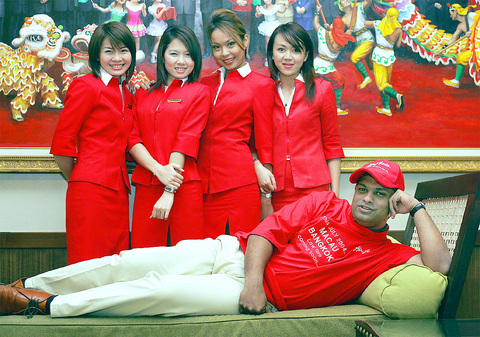Southeast Asia's biggest budget carrier AirAsia says it is "baffled" by a codesharing deal involving national carrier Malaysia Airlines, Singapore Airlines (SIA) and SIA subsidiary SilkAir.
AirAsia questioned how the deal would help the Malaysian government's ambitions of making Kuala Lumpur International Airport (KLIA) a major regional hub and supplant Singapore's Changi Airport.
"I am baffled by the tripartite codesharing," AirAsia's executive director Kamarudin Meranun told reporters in a recent interview.

PHOTO: AFP
Kamarudin said the deal would give Singapore Airlines and SilkAir frequent access to Malaysian domestic destinations without having to fly to KLIA.
"When we requested locating the low-cost terminal at Subang Airport, they [Malaysia Airlines] strongly opposed the reopening of the old airport, saying it will be against the plan to make KLIA a regional hub," he said.
"Now two carriers out of Changi will have access to Malaysia's domestic destinations without having to fly to KLIA. How is KLIA going to benefit?" Kamarudin said.
"Changi Airport will see an increase in passenger traffic."
The government has picked KLIA over Subang as the location for a new 110 million ringgit (US$29 million) low-cost carrier terminal.
Singapore Airlines and SilkAir will start codeshare flights with Malaysia Airlines between Singapore and Kuching in Malaysia's Sarawak state, and between Singapore and Kota Kinabalu in Malaysia's Sabah state, from March 27.
These flights, along with ones to Penang, will bypass KLIA.
AirAsia, meanwhile, has been barred by the Singapore government from flying to Changi from Malaysia and Indonesia.
Azrul Azwar, senior economist with MIDF, said he also is puzzled at the codeshare deal and "there is some indication that Malaysia Airlines gets special treatment."
"Malaysia's ambition to become the premier hub in Asia will have to be shared with Singapore," Azrul said.

CHIPMAKING INVESTMENT: J.W. Kuo told legislators that Department of Investment Review approval would be needed were Washington to seek a TSMC board seat Minister of Economic Affairs J.W. Kuo (郭智輝) yesterday said he received information about a possible US government investment in Taiwan Semiconductor Manufacturing Co (TSMC, 台積電) and an assessment of the possible effect on the firm requires further discussion. If the US were to invest in TSMC, the plan would need to be reviewed by the Department of Investment Review, Kuo told reporters ahead of a hearing of the legislature’s Economics Committee. Kuo’s remarks came after US Secretary of Commerce Howard Lutnick on Tuesday said that the US government is looking into the federal government taking equity stakes in computer chip manufacturers that

NORTHERN STRIKE: Taiwanese military personnel have been training ‘in strategic and tactical battle operations’ in Michigan, a former US diplomat said More than 500 Taiwanese troops participated in this year’s Northern Strike military exercise held at Lake Michigan by the US, a Pentagon-run news outlet reported yesterday. The Michigan National Guard-sponsored drill involved 7,500 military personnel from 36 nations and territories around the world, the Stars and Stripes said. This year’s edition of Northern Strike, which concluded on Sunday, simulated a war in the Indo-Pacific region in a departure from its traditional European focus, it said. The change indicated a greater shift in the US armed forces’ attention to a potential conflict in Asia, it added. Citing a briefing by a Michigan National Guard senior

POWER PLANT POLL: The TPP said the number of ‘yes’ votes showed that the energy policy should be corrected, and the KMT said the result was a win for the people’s voice The government does not rule out advanced nuclear energy generation if it meets the government’s three prerequisites, President William Lai (賴清德) said last night after the number of votes in favor of restarting a nuclear power plant outnumbered the “no” votes in a referendum yesterday. The referendum failed to pass, despite getting more “yes” votes, as the Referendum Act (公民投票法) states that the vote would only pass if the votes in favor account for more than one-fourth of the total number of eligible voters and outnumber the opposing votes. Yesterday’s referendum question was: “Do you agree that the Ma-anshan Nuclear Power Plant

ENHANCED SECURITY: A Japanese report said that the MOU is about the sharing of information on foreign nationals entering Japan from Taiwan in the event of an emergency The Ministry of Foreign Affairs yesterday confirmed that Taiwan and Japan had signed an agreement to promote information exchanges and cooperation on border management, although it did not disclose more details on the pact. Ministry spokesman Hsiao Kuang-wei (蕭光偉) said the ministry is happy to see that the two nations continue to enhance cooperation on immigration control, in particular because Taiwan and Japan “share a deep friendship and frequent people-to-people exchanges.” “Last year, more than 7.32 million visits were made between the two countries, making it even more crucial for both sides to work closer on immigration and border control,” he said. Hsiao